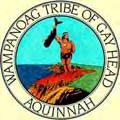|
Canku Ota |
|
(Many Paths) |
|
An Online Newsletter Celebrating Native America |
|
December 2, 2000 - Issue 24 |
|
|
|
Wampanoag Tribal Member Is Teaching Her Native Language |
|
Wopanaak hadn't been written or spoken for nearly 150 years |
|
Published in The Day |
|
Jessie Little Doe Fermino saw Wampanoag Indian ancestors she didn't recognize, speaking a language she could identify but couldn't understand. It was Wopanaak — the Wampanoag language that hadn't been written or spoken for nearly 150 years. “I got these feelings in me of wanting to know what Wopanaak was, how it was used,” said Fermino. Seven years after she had that dream, the 36-year-old former social worker is teaching fellow tribal members what she learned. “I started looking around for documentation, thinking there was none, and instead I found a huge body of native written documents,” said Fermino, who earned a masters in linguistics from the Massachusetts Institute of Technology. The Wampanoags' legacy includes letters to the Massachusetts Legislature in the 1700s, pleading with lawmakers to keep white settlers from taking their land. The first Bible printed in the New World was a Wopanaak translation of the King James Bible printed at Harvard in 1663, by John Eliot. The Wopanaak language was translated into phonetic English by missionaries such as Eliot, who believed it their duty to convert the Indians to Christianity. Wopanaak reflects the Wampanoags' own beliefs about their relationships with each other and the world around them. “In a lot of ways, it's the essence of being part of a circle or a tribe,” Fermino explained. “You place someone else first, not always yourself ... You are responsible to your whole people and that's reflected in the language.” For example, in statements addressing other people, the speaker comes last, not first. When you mean “I see you,” you say “you see I.” In Wopanaak, that's “ku na ush” (pronounced kuh nah'sh). Kinship terms are always possessed by someone else, like your sister, my father. To say “my mother,” you say “n8h kas” (noo kah). The “8” is not a typo; it's a letter for the “oo” sound in the Wopanaak language. Fermino's classes are restricted to Wampanoags. They are held in Mashpee, where she lives, and in Aquinnah, on Martha's Vineyard. Five students from Aquinnah were attending class in Mashpee by ferry, but increased interest led Fermino to hold classes on the island. She teaches full time. Her students have fundamental goals. They want to learn enough Wopanaak to converse with each other, write poetry, read the writings of their ancestors and sing and pray in their own language. “As a tribal people we know we always had our own language,” said Tobias J. Vanderhoop, 26, of Aquinnah, a member of the Gay Head Aquinnah Wampanoag tribal council. “For a lot of us there has always been a wish we could speak our own language.” To hear the language spoken, Vanderhoop says, evokes emotion that is hard to put into words. “Chills just overtake you,” he said. “Not only are you hearing your language, but you can understand it, and you know your ancestors can understand it. So it is a very powerful thing.” The Wampanoag are one of a number of American Indian tribes who are taking steps to revive or reclaim their language. The decreasing number of fluent speakers, particularly among children and young adults, is spurring those efforts. “The time is pressing against survival,” said Greg Bigler, co-founder of the Oklahoma Native Language Foundation in Sapulpa, Okla., about 15 miles southwest of Tulsa. “That's why efforts have to be made to do whatever can be done.” The trend holds true even with more popular languages such as Navajo. The number of Navajo children who speak only English increased by 30 percent between 1980 and 1990. Scholars believe there were about 300 native languages spoken in North America when European colonization began. That has dwindled to about 155 languages today. “Language reclamation may seem like a novelty. But in 20 or 30 years it's going to be the norm,” Fermino said. “Within a generation you could lose nearly all the fluency of native speakers.” On the Net: Wampanoag Tribe of Gay Head Aquinnah: |
|
|
|
|
| Canku Ota is a free Newsletter celebrating Native America, its traditions and accomplishments . We do not provide subscriber or visitor names to anyone. Some articles presented in Canku Ota may contain copyright material. We have received appropriate permissions for republishing any articles. Material appearing here is distributed without profit or monetary gain to those who have expressed an interest. This is in accordance with Title 17 U.S.C. section 107. |
|
Canku Ota is a copyright of Vicki Lockard and Paul Barry. |
|
The "Canku Ota - A Newsletter Celebrating Native America"
web site and its design is the Copyright © 1999 of Paul C. Barry. |
 BOSTON
— It started with a dream.
BOSTON
— It started with a dream.